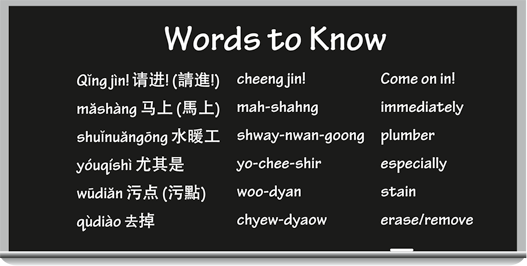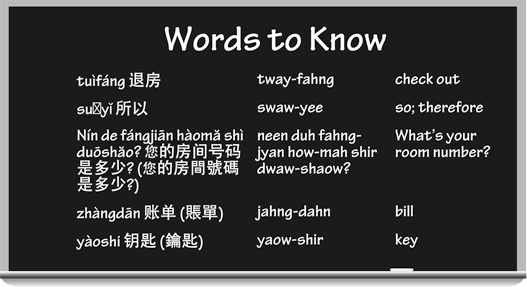Chinese For Dummies (128 page)
Read Chinese For Dummies Online
Authors: Wendy Abraham
kuh-yee.
Yes.
Carl:
YóuqÃshì zhèige wÅ«diÇn. Néng bùnéng qùdià o?
yo-chee-shir jay-guh woo-dyan. nung boo-nung chyew-dyaow?
Especially this stain. Can it be removed?
Housekeeper:
MéiyÇu wèntÃ.
mayo one-tee.
No problem.
Carl:
HÇo. Xièxiè.
how. shyeh-shyeh.
Great. Thanks.

 As you can see in the previous Talkin' the Talk dialogue, the coverb
As you can see in the previous Talkin' the Talk dialogue, the coverb
bÇ
æ
(bah) often appears right after the subject of the sentence, separating it from the direct object, which is always something concrete rather than an abstract idea. It separates the indirect and direct objects.
You don't have the following sentence pattern:
Subject + Verb + Complement (+ Indirect Object) + Object
Instead, you have this one:
Subject +
bÇ
+ Object + Verb + Complement (+ Indirect Object)
Here are some examples:
QÇng nÇ bÇ nÇde hùzhà o ná gÄi qiántái fúwùyuán.
è¯·ä½ æä½ çæ¤ç
§æ¿ç»åå°æå¡å
. (
è«ä½ æä½ çè·ç
§æ¿çµ¦åå°æåå¡
.) (cheeng nee bah nee-duh hoo-jaow nah gay chyan-tye foo-woo-ywan.) (
Please give your passport to the front desk clerk.
)
WÇ bÇ shÅ« jiè gÄi nÇ.
ææ书æ¥ç»ä½
. (
æææ¸å給ä½
.) (waw bah shoo jyeh gay nee.) (
I'll loan you the book.
)
Checking Out Before Heading Out
That oh-so-depressing time has come again. Time to say goodbye. Time to
téngchū
è
¾åº
(
騰åº
) (tuhng-choo) (
vacate
) your hotel room and
tuìfáng
éæ¿
(tway-fahng) (
check out
).
You may need to say some of the following as you begin the end of your stay:
 Jiézhà ng yÇhòu wÇ néng bùnéng bÇ bÄoguÇ liú zà i qiántái?
Jiézhà ng yÇhòu wÇ néng bùnéng bÇ bÄoguÇ liú zà i qiántái?
ç»å¸ä»¥åæè½ä¸è½æå
裹çå¨åå°
? (
çµå¸³ä»¥å¾æè½ä¸è½æå
裹çå¨åå°
?) (jyeh-jahng ee-ho waw nung boo-nung bah baow-gwaw lyo dzye chyan-tye?) (
After checking out, may I leave my bags at the front desk?
)
 NÇmen jiÄshòu shénme xìnyòng kÇ?
NÇmen jiÄshòu shénme xìnyòng kÇ?
ä½ ä»¬æ¥æ¶ä»ä¹ä¿¡ç¨å¡
? (
ä½ åæ¥æ¶ç麼信ç¨å¡
?) (nee-men jyeh-show shummuh sheen-yoong kah?) (
Which credit cards do you accept?
)
 WÇ bù yÄ«nggÄi fù zhè xià ng.
WÇ bù yÄ«nggÄi fù zhè xià ng.
æä¸åºè¯¥ä»è¿é¡¹
. (
æä¸æ該ä»éé
.)
(waw boo eeng-gye foo jay shyahng.) (
I shouldn't be charged for this.
)
 WÇ yà o fù zhà ng.
WÇ yà o fù zhà ng.
æè¦ä»è´¦
. (
æè¦ä»è³¬
.) (waw yaow foo jahng.) (
I'd like to pay the bill.
)
 YÇu méiyÇu qù fÄijÄ«chÇng de bÄnchÄ?
YÇu méiyÇu qù fÄijÄ«chÇng de bÄnchÄ?
æ没æå»é£æºåºçç车
? (
ææ²æå»é£æ©å ´ççè»
?) (yo mayo chyew fay-jee-chahng duh ban-chuh?) (
Is there a shuttle to the airport?
)
 Zhè búshì wÇde zhÄngdà n.
Zhè búshì wÇde zhÄngdà n.
è¿ä¸æ¯æçè´¦å
. (
éä¸æ¯æç賬å®
.) (jay boo-shir waw-duh jahng-dahn.) (
This isn't my bill.
)
Talkin' the Talk
Nancy is ready to check out after her three-day stay at a five-star hotel in Shanghai. She approaches the reception clerk to check out.
Nancy:
NÇ hÇo. WÇ jÄ«ntiÄn yà o tuìfáng, suÇyÇ yà o fù zhà ng.
nee how. waw jin-tyan yaow tway-fahng, swaw-yee yaow foo jahng.
Hello. I'd like to check out today, so I'd like to pay the bill.
Clerk:
QÇngwèn, nÃn de fángjiÄn hà omÇ shì duÅshÇo?
cheeng-one, neen duh fahng-jyan how-mah shir dwaw-shaow?
May I ask, what's your room number?
Nancy:
WÇlÃngliù hà o fángjiÄn.
woo-leeng-lyo how fahng-jyan.
Room 506.
Clerk:
HÇo. Zhè shì nÃnde zhà ngdÄn. YÃgòng yìqiÄn wÇbÇi kuà i.
how. jay shir neen-duh jahng-dahn. ee-goong ee-chyan woo-bye kwye.
Okay. This is your bill. It's $1,500 altogether.
Nancy pays the bill with her credit card.
Nancy:
Zhè shì wÇmen fángjiÄn de yà oshi.
jay shir waw-mun fahng-jyan duh yaow-shir.
This is my room key.
Clerk:
Xièxiè.
shyeh-shyeh.
Thank you.
Nancy:
Jiézhà ng yÇhòu wÇ néng bùnéng bÇ bÄoguÇ liú zà i qiántái?
jyeh-jahng ee-ho waw nung boo-nung bah baow-gwaw lyo dzye chyan-tye?
After checking out, may I leave my bags at the front desk?
Clerk:
KÄyÇ. MéiyÇu wèntÃ.
kuh-yee. mayo one-tee.
Yes. No problem.
